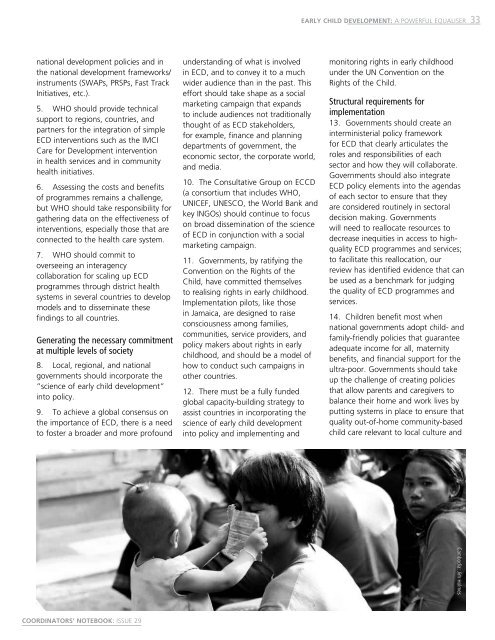A global call to action for early childhood
A global call to action for early childhood
A global call to action for early childhood
Create successful ePaper yourself
Turn your PDF publications into a flip-book with our unique Google optimized e-Paper software.
Early child development: A powerful equaliser<br />
33<br />
national development policies and in<br />
the national development frameworks/<br />
instruments (SWAPs, PRSPs, Fast Track<br />
Initiatives, etc.).<br />
5. WHO should provide technical<br />
support <strong>to</strong> regions, countries, and<br />
partners <strong>for</strong> the integration of simple<br />
ECD interventions such as the IMCI<br />
Care <strong>for</strong> Development intervention<br />
in health services and in community<br />
health initiatives.<br />
6. Assessing the costs and benefits<br />
of programmes remains a challenge,<br />
but WHO should take responsibility <strong>for</strong><br />
gathering data on the effectiveness of<br />
interventions, especially those that are<br />
connected <strong>to</strong> the health care system.<br />
7. WHO should commit <strong>to</strong><br />
overseeing an interagency<br />
collaboration <strong>for</strong> scaling up ECD<br />
programmes through district health<br />
systems in several countries <strong>to</strong> develop<br />
models and <strong>to</strong> disseminate these<br />
findings <strong>to</strong> all countries.<br />
Generating the necessary commitment<br />
at multiple levels of society<br />
8. Local, regional, and national<br />
governments should incorporate the<br />
“science of <strong>early</strong> child development”<br />
in<strong>to</strong> policy.<br />
9. To achieve a <strong>global</strong> consensus on<br />
the importance of ECD, there is a need<br />
<strong>to</strong> foster a broader and more profound<br />
understanding of what is involved<br />
in ECD, and <strong>to</strong> convey it <strong>to</strong> a much<br />
wider audience than in the past. This<br />
ef<strong>for</strong>t should take shape as a social<br />
marketing campaign that expands<br />
<strong>to</strong> include audiences not traditionally<br />
thought of as ECD stakeholders,<br />
<strong>for</strong> example, finance and planning<br />
departments of government, the<br />
economic sec<strong>to</strong>r, the corporate world,<br />
and media.<br />
10. The Consultative Group on ECCD<br />
(a consortium that includes WHO,<br />
UNICEF, UNESCO, the World Bank and<br />
key INGOs) should continue <strong>to</strong> focus<br />
on broad dissemination of the science<br />
of ECD in conjunction with a social<br />
marketing campaign.<br />
11. Governments, by ratifying the<br />
Convention on the Rights of the<br />
Child, have committed themselves<br />
<strong>to</strong> realising rights in <strong>early</strong> <strong>childhood</strong>.<br />
Implementation pilots, like those<br />
in Jamaica, are designed <strong>to</strong> raise<br />
consciousness among families,<br />
communities, service providers, and<br />
policy makers about rights in <strong>early</strong><br />
<strong>childhood</strong>, and should be a model of<br />
how <strong>to</strong> conduct such campaigns in<br />
other countries.<br />
12. There must be a fully funded<br />
<strong>global</strong> capacity-building strategy <strong>to</strong><br />
assist countries in incorporating the<br />
science of <strong>early</strong> child development<br />
in<strong>to</strong> policy and implementing and<br />
moni<strong>to</strong>ring rights in <strong>early</strong> <strong>childhood</strong><br />
under the UN Convention on the<br />
Rights of the Child.<br />
Structural requirements <strong>for</strong><br />
implementation<br />
13. Governments should create an<br />
interministerial policy framework<br />
<strong>for</strong> ECD that cl<strong>early</strong> articulates the<br />
roles and responsibilities of each<br />
sec<strong>to</strong>r and how they will collaborate.<br />
Governments should also integrate<br />
ECD policy elements in<strong>to</strong> the agendas<br />
of each sec<strong>to</strong>r <strong>to</strong> ensure that they<br />
are considered routinely in sec<strong>to</strong>ral<br />
decision making. Governments<br />
will need <strong>to</strong> reallocate resources <strong>to</strong><br />
decrease inequities in access <strong>to</strong> highquality<br />
ECD programmes and services;<br />
<strong>to</strong> facilitate this reallocation, our<br />
review has identified evidence that can<br />
be used as a benchmark <strong>for</strong> judging<br />
the quality of ECD programmes and<br />
services.<br />
14. Children benefit most when<br />
national governments adopt child- and<br />
family-friendly policies that guarantee<br />
adequate income <strong>for</strong> all, maternity<br />
benefits, and financial support <strong>for</strong> the<br />
ultra-poor. Governments should take<br />
up the challenge of creating policies<br />
that allow parents and caregivers <strong>to</strong><br />
balance their home and work lives by<br />
putting systems in place <strong>to</strong> ensure that<br />
quality out-of-home community-based<br />
child care relevant <strong>to</strong> local culture and<br />
Cambodia: Jim Holmes<br />
COORDINATORS’ NOTEBOOK: ISSUE 29
















